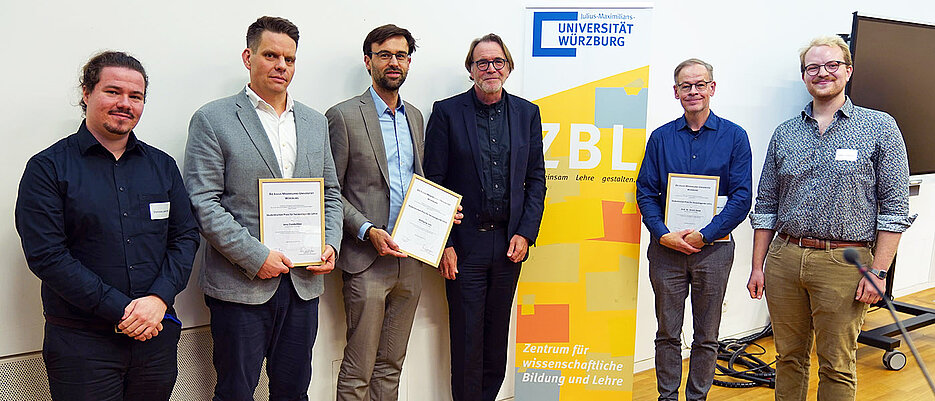Prizes for Future-oriented Teaching With AI
11/25/2025This year's student prize for outstanding teaching goes to the psychologist Armin Stock and the physics didactics experts Jens Damköhler and Wolfgang Lutz.

University Vice President Andreas Dörpinghaus and the "Fachschaftenrat", a student council, awarded the annual "Student Prize for Outstanding Teaching" at the "JMU Teaching Day" on 19 November 2025. This time, the students of the University of Würzburg had nominated teachers who had shown particular commitment in the category "Future-oriented teaching with artificial intelligence".
"The critical handling of information, the ability to conduct your own research or simply writing a scientific text are skills that everyone should have mastered by the end of their studies at the latest," said Stephan Jaborek, Chairman of the Fachschaftenrat, in his laudatory speech. For teaching, this means a rethink, as AI tools require new teaching methods and forms of examination to be devised.
For the first time, the prize was awarded once in the natural sciences and once in the humanities. "These prizes are particularly important," emphasised Andreas Dörpinghaus, "because they show how much students are aware of where teachers are breaking new ground, using digital possibilities creatively and promoting critical thinking in the process."
Armin Stock: Teaching With AI-generated Texts
The first prize winner was honoured for his critical examination of information and text generation. Professor Armin Stock is a psychologist and head of the Centre for the History of Psychology. In his seminar, he had students generate a supposedly scientific paper using artificial intelligence and then correct it themselves.
"Through this very practice-oriented work with AI, the students were able to clearly recognise the strengths, but also the major weaknesses of AI. The core skills of source work and correct research were taught in a completely new way," explains Jaborek.
For Armin Stock, it is clear that it is the task of society, and therefore also of psychologists, to create an ethical approach to AI that is beneficial to humanity. He sees the award as a nice sign of recognition from his students for his commitment and enthusiasm for good teaching.
Jens Damköhler and Wolfgang Lutz: AI-supported Teaching and Learning Lab
The second teaching prize was awarded as a team prize to Jens Damköhler and Wolfgang Lutz from the Department of Physics and its Didactics. They were honoured for their teaching concept in the Physics Teaching-Learning Lab, in which students develop model-based experimental stations for pupils and test them with the target groups.
For several semesters now, a specifically trained AI-supported chatbot has also been supporting the students in designing and reflecting on their experimental stations.
"This enables students to learn how to use AI intuitively and productively," says Hannes Winkler from the Fachschaftenrat. He emphasises: "The teaching and learning lab is doing pioneering work in teaching students how to use AI responsibly, while at the same time creating new insights into the benefits and challenges of this technology in teaching."
The two award winners are delighted with the honour and would like to thank the students in their seminar in particular, who got involved in the experiment, and the WueDive project for their support in developing the chatbot.
Special Recognition for Teaching
The "Student Prize for Outstanding Teaching" has been awarded annually by the University Board since 2019 at the suggestion of the student's representation. Teachers who develop and implement innovative teaching concepts are honoured. All students can submit their proposals online with a meaningful explanation. The Student Representative Council, as the jury, then proposes the teacher of their choice to the university management based on the proposals received.






